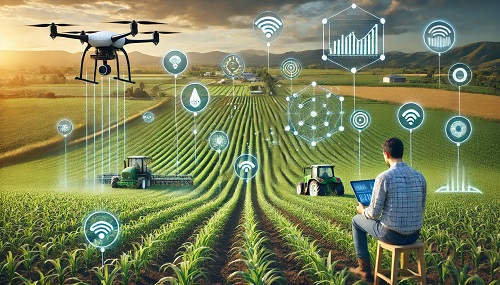Precision agriculture (PA) is a farming management concept that uses data, technology, and automation to optimize the efficiency of agricultural inputs (like water, fertilizers, and pesticides) while maximizing crop yields and sustainability. It leverages advanced tools to monitor, measure, and respond to inter- and intra-field variability in crops, making farming more data-driven and efficient. Here’s how it works and the technologies involved.
Key Technologies in Precision Agriculture
1. Global Positioning System (GPS) and Geographic Information System (GIS):
GPS allowsfarmers to map their fields accurately and navigate large-scale farming equipment with precision, down to inches.
GIS collects, stores, analyzes, and visualizes data about specific locations in a farm field, helping farmers make informed decisions about soil conditions, crop performance, and more.2. Remote Sensing and Satellite Imaging:
Satellites and drones equipped with multispectral and hyperspectral cameras capture detailed images of fields. These images help monitor crop health, detect diseases, and assess soil moisture and nutrient levels. This data is analyzed to make timely interventions.3. Soil Sensors:
– Soil moisture and nutrient sensors give real-time information about soil conditions. Farmers can monitor pH levels, temperature, water content, and nutrient deficiencies. This enables efficient irrigation and fertilizer application, reducing waste and improving crop yields.4. Variable Rate Technology (VRT):
– VRT allows farmers to apply inputs (water, fertilizer, pesticides) at varying rates across a field based on localized conditions. Rather than treating the entire field uniformly, VRT systems adjust the amount of input to specific areas, optimizing resource use and minimizing environmental impact.5.Drones and Unmanned Aerial Vehicles (UAVs):
– Drones are widely used for monitoring large areas of farmland. They can capture high-resolution images that reveal issues like pest infestations, water stress, or crop diseases, helping farmers act quickly. Drones can also apply fertilizers or pesticides in a targeted and efficient manner.6. Data Analytics and Machine Learning:
– Farmers collect large volumes of data from sensors, drones, and satellites. Advanced data analytics and machine learning algorithms are used to analyze this data and provide actionable insights. Predictive models can forecast yields, recommend optimal planting times, and suggest the best crop varieties for specific conditions.7. Automated Machinery and Robotics:
– Automated tractors and harvesters can operate independently, reducing the need for manual labor. These machines use GPS and sensors to plant seeds, apply fertilizers, and harvest crops with high precision, reducing waste and improving efficiency.
Benefits of Precision Agriculture
1. Increased Yields:
– Precision agriculture allows farmers to make data-driven decisions to optimize input use, ensuring crops get exactly what they need, when they need it. This leads to improved plant health, higher yields, and better crop quality.2. Cost Efficiency:
– By applying fertilizers, pesticides, and water only where needed, farmers can reduce waste and lower input costs. Automated machinery and drones also reduce the labor cost and improve productivity.3. Sustainability:
– Precision farming minimizes the environmental impact of agriculture by reducing water use, chemical runoff, and soil erosion. Optimizing the use of fertilizers and pesticides helps prevent contamination of nearby water bodies and ecosystems.
4. Resource Conservation:
– Precision agriculture helps conserve essential resources like water and energy. Smart irrigation systems ensure that crops receive the right amount of water without overuse, conserving water in regions where it is scarce.5. Risk Management:
– With real-time monitoring and predictive analytics, farmers can identify problems like pests, diseases, or adverse weather conditions early on. This helps them mitigate risks and avoid potential crop losses.
Precision agriculture represents a promising solution for the growing demands on global food production while addressing the challenges of climate change and environmental sustainability.
